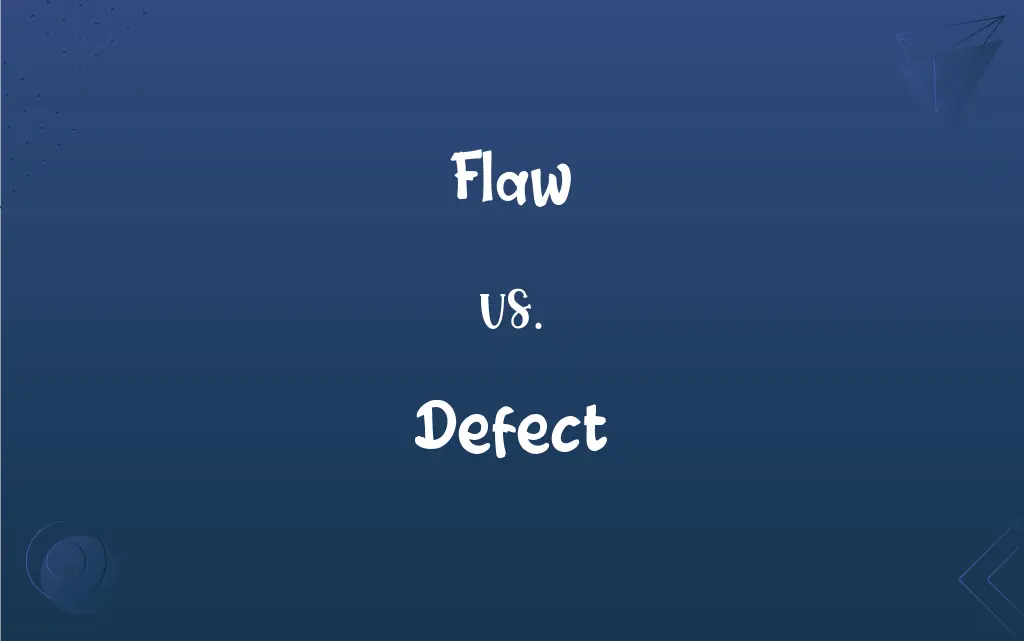Flaw vs. Defect: What's the Difference?
Edited by Aimie Carlson || By Janet White || Published on February 2, 2024
A flaw is a minor imperfection or blemish, while a defect is a significant shortcoming or inadequacy.

Key Differences
A flaw often refers to a minor imperfection that does not usually compromise the overall integrity or functionality of an object or system. In contrast, a defect is a more serious shortcoming, typically indicating a failure to meet standard specifications or expectations.
The term "flaw" is commonly used in contexts where the imperfection is less critical, often aesthetic or superficial. "Defect," however, implies a deeper, often functional fault that may affect the utility or safety of an item or system.
"Flaw" can sometimes have a less negative connotation, occasionally even adding uniqueness to the subject. "Defect" typically carries a more negative connotation, suggesting a failure or significant problem.
In literary contexts, a flaw is often associated with a character’s minor weakness, which might lead to their downfall. A defect, however, is less commonly used in such contexts and is more associated with physical or systemic failures.
Both flaw and defect denote imperfections, the severity and implications of these terms differ, with "flaw" indicating a less serious issue and "defect" pointing to a more substantial problem.
ADVERTISEMENT
Comparison Chart
Severity
Generally minor or less serious
Often significant or serious
Nature
Often aesthetic or superficial
Usually functional or structural
Impact on Functionality
Rarely affects overall functionality
Likely affects functionality or safety
Contextual Use
Common in personal attributes, art
Frequent in manufacturing, quality control
Connotation
Can be neutral or slightly negative
Strongly negative, implies failure
ADVERTISEMENT
Flaw and Defect Definitions
Flaw
A weakness in character.
His inability to forgive was a flaw in his personality.
Defect
A lack or absence of something necessary or desirable.
The plan had a major defect: lack of funding.
Flaw
An error or mistake in a process.
The flaw in the experiment’s design skewed the results.
Defect
A shortcoming or imperfection in something that reduces its quality.
The software had a defect that caused frequent crashes.
Flaw
A fault in a plan or theory.
There was a fundamental flaw in their strategy, leading to failure.
Defect
A moral or character weakness.
His greatest defect was his inability to listen to others.
Flaw
A small imperfection or blemish.
The vase had a minor flaw, a tiny chip on the rim.
Defect
A physical or functional failure in a product or system.
The car was recalled due to a critical safety defect.
Flaw
A defect or crack in a surface.
A small flaw in the diamond reduced its value.
Defect
A deviation from standard specifications.
The inspection revealed several defects in the building’s structure.
Flaw
An imperfection, often concealed, that impairs soundness
A flaw in the crystal that caused it to shatter.
Defect
An imperfection or lack that causes inadequacy or failure; a shortcoming or deficiency.
FAQs
Is a defect always serious?
Generally, yes. It implies a significant shortcoming.
Can a defect be fixed?
Often, yes, but it might require significant effort or resources.
Can a system have flaws?
Yes, systems can have minor flaws in design or function.
Can a flaw become a defect?
Yes, if a flaw worsens or affects functionality, it may become a defect.
Can a flaw be positive?
Rarely; a flaw is usually negative but can add character in certain contexts.
Are flaws always visible?
Not necessarily. They can be internal or in character.
Is a defect legally significant?
Yes, especially in consumer goods, where it can lead to recalls or lawsuits.
Do all products have defects?
Not all, but many products can have defects due to manufacturing errors.
Can character flaws be harmful?
Potentially, as they can affect personal relationships and decisions.
Is a flaw the same as a fault?
Similar, but a fault is often more serious than a flaw.
Can flaws be intentional?
Rarely; they are usually unintended.
Are defects covered under warranties?
Usually, especially if they are manufacturing defects.
Can people have defects?
In a metaphorical sense, yes, often referring to character defects.
Are defects always the result of poor design?
Not always. They can also arise from manufacturing issues or material faults.
Do defects always need to be repaired?
Often, especially if they pose a safety risk or significantly impair functionality.
Are defects always obvious?
Not always; some can be hidden or not immediately apparent.
Can a flaw add value?
In rare cases, like in art or antiques, a flaw can add character or uniqueness.
Are all defects fixable?
Not always. Some defects may be too costly or impossible to correct.
Can a flaw be ignored?
Sometimes, if it's minor and doesn't affect overall quality or function.
Can flaws be subjective?
Yes, what is considered a flaw can vary based on personal opinions or standards.
About Author
Written by
Janet WhiteJanet White has been an esteemed writer and blogger for Difference Wiki. Holding a Master's degree in Science and Medical Journalism from the prestigious Boston University, she has consistently demonstrated her expertise and passion for her field. When she's not immersed in her work, Janet relishes her time exercising, delving into a good book, and cherishing moments with friends and family.
Edited by
Aimie CarlsonAimie Carlson, holding a master's degree in English literature, is a fervent English language enthusiast. She lends her writing talents to Difference Wiki, a prominent website that specializes in comparisons, offering readers insightful analyses that both captivate and inform.







































































